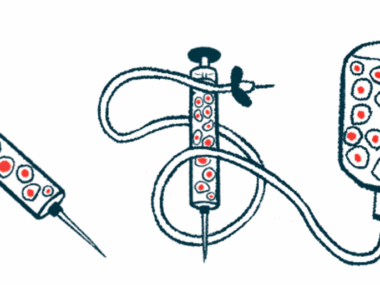#AAN2022 – IPX-203 Gives 1.5+ Hours More ‘Good On’ Time Per Dose
Written by |

Treatment with oral IPX-203, Amneal Pharmaceuticals’ investigational extended-release carbidopa-levodopa (CD/LD) formulation, reduced “off” time by about 1.5 hours a dose, on average, compared to immediate-release tablets of the medication, according to data from a Phase 3 RISE-PD clinical trial.
Top-line results from RISE-PD were announced last year. Detailed results are being presented in April at the 2022 annual meeting of the American Academy of Neurology (AAN), in a talk titled, “A Phase 3 Trial of IPX203 vs CD-LD IR in Parkinson’s Disease Patients with Motor Fluctuations (RISE-PD).”
Parkinson’s is caused by the death and dysfunction of brain cells responsible for making dopamine, an important neurotransmitter nerves use to communicate with each other. CD/LD is the Parkinson’s therapy gold standard and works by giving the brain extra raw materials with which to manufacture dopamine.
Although CD/LD therapy can effectively ease many Parkinson’s symptoms, patients often experience “off” periods, where symptoms are not adequately controlled between doses. IPX-203 is an extended-release CD/LD therapy designed to release the medicine into the bloodstream in a way that maintains clinically relevant levels longer, helping to reduce “off” time.
The Phase 3 RISE-PD trial (NCT03670953) enrolled 506 adults with advanced Parkinson’s ages 40 and older. For the first three weeks, the patients underwent dose-adjusting treatment with immediate-release CD/LD, then underwent four weeks of IPX-203 treatment. Participants then were randomized to receive either IPX-203 or standard immediate-release CD/LD for 13 weeks.
Results showed that, compared to the immediate-release version, IPX-203 led to on average 0.53 more hours of “good on” time per day — defined as times without symptoms or troublesome dyskinesia (uncontrolled movements), which can be a side effect of CD/LD therapy. Consistently, “off” time also was reduced, by about 0.48 hours per day on average.
Based on clinician assessments, 29.7% of participants treated with IPX-203 were “much improved” or “very much improved” in terms of overall health, compared to 18.8% of those given immediate-release CD/LD.
Assessments of motor symptom severity were similar between the groups. The most common side effects reported in the study were falls, nausea, and urinary tract infections.
In a separate poster at AAN, researchers will present findings from a post hoc analysis of data from RISE-PD. A post hoc analysis is designed and carried out after the study has been conducted and all of the data is collected (in clinical trials, analyses to determine efficacy usually are specified before the first patient has been dosed). The poster is titled, “Duration of Benefit Per Dose: Post Hoc Analysis of ”Good On” Time Per Dose for IPX203 vs CD-LD IR in the RISE-PD Phase 3 Trial.”
The post hoc analysis included data for 246 patients treated with immediate-release CD/LD and 249 given IPX-203. The researchers specifically set out to assess how much “good on” time patients were getting with each dose of medication they took.
Results indicated that, by the end of the study, each dose of immediate-release CD/LD led to about 2.21 hours of “good on” time, on average. By comparison, each dose of IPX-203 led to 3.76 hours of “good on” time — a difference of more than 1.5 hours.
“The findings from a post hoc analysis of the RISE-PD trial indicated that IPX-203 may offer patients more ‘Good On’ time per dose, compared to immediate-release CD/LD. Increasing the amount of ‘Good On’ time, if confirmed, can reduce disruptions caused by troublesome dyskinesia and provide more consistent symptom control throughout the day,” Robert Hauser, MD, a professor at the University of South Florida and co-author of the research, said in a press release.
Amneal intends to submit an application seeking approval of IPX-203 as a Parkinson’s treatment in the U.S. later this year.
Note: The Parkinson’s News Today team is providing coverage of the American Academy of Neurology (AAN) 2022 Annual Meeting.



